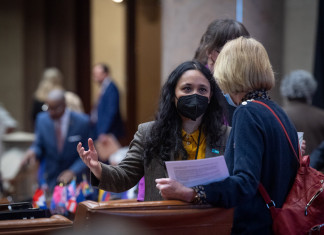Red Hook’s town board is moving forward on changes to local laws that would effectively prohibit the practice of hydrofracking and use of its byproducts within the town’s borders.
At its March 27 meeting, the board discussed the changes and unanimously agreed to prepare an environmental action form (EAF), which would send the changes to the town planning board and the county for review.
When the issue of hydrofracking, or fracking, first came to the board last July, Councilman Jim Ross objected to any town decision being made before the state Department of Environmental Conservation had completed its deliberations on the controversial natural-gas extraction process, which has become a contentious issue across the state.
This time, Supervisor Sue Crane went out of her way to explain how the three proposed changes fit into the town’s existing code, making it clear that preventing fracking-related activities in Red Hook preserves the town as it is, without taking away any freedoms.
The first change is a new law that would prohibit use of fracking by-products as de-icers on town roads. The by-products, or brine, consist of the leftover chemicals that are injected into the natural gas wells to force out the gas. The ingredients of these injections are not well-known because natural gas companies say their composition is a trade secret; however, they are widely believed to include harmful chemicals and known carcinogens. Ulster County and the City of Kingston passed bans on the brine in 2012.
Although Red Hook has received confirmation from the state and from the town highway superintendent that such by-products are not used on either state or town roads, a ban would ensure that they never are.
“There’s no doubt in my mind that we don’t use… hydrofracking brine on our roads today, either the county, the state, or the town. And none of us wish that to happen because of our aquifer, so that law seems to be self-evident,” Crane said.
Second, the board would amend the existing zoning code that prohibits heavy industry to “very specifically include natural gas and oil extraction activities as part of [that] definition,” town attorney Christine Chale said.
Crane confirmed that the proposed change “simply identifies the hydrofracking… as a heavy industry” without changing the existing law’s intent.
Councilwoman Brenda Cagle agreed, noting that “We already do prohibit heavy industry and this is just to clarify that it includes fracking.”
Finally, the board has also proposed amending the current zoning code to outlaw the disposal of natural gas or oil drilling waste products anywhere in the town.
With this three-pronged approach, the board hopes to prevent any fracking-related activity in the town using the means at their disposal under the state’s home-rule tradition, namely zoning law.
Towns such as Dryden in Tompkins County and Middlefield in Otsego County have had similar zoning-based fracking bans upheld in court after being challenged by the natural gas industry. But in both cases, the courts’ actions are being appealed.
Town planner Michele Grieg was expected to present a completed Environmental Assessment Form assessing the impact of the proposed laws at the town board’s April 9 meeting. If approved by the board, the EAF will then be sent to the town planning board and the county for review. A public hearing will then be set and, according to Crane, the board could vote on the changes as early as its April 24 meeting.







Facebook Comments